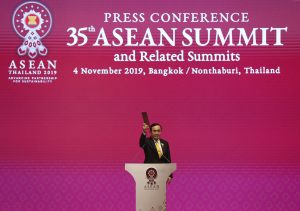Early November marked the conclusion of yet another round of ASEAN summitry, with a range of headlines from the low level of U.S. representation to India’s withdrawal from the Regional Comprehensive Economic Partnership (RCEP). To discuss the outcomes of this round of regional summitry, The Diplomat’s Senior Editor Prashanth Parameswaran spoke to Termsak Chalermpalanupap, a visiting fellow at the Thailand Studies Program of the ISEAS-Yusof Ishak Institute in Singapore. Previously, Termsak had served at the ASEAN Secretariat from 1993 to 2012.
Thailand was the holder of ASEAN’s annually rotating chairmanship for 2019 and helped manage the summits we witnessed this year. With the latest round of ASEAN summitry now completed, how would you assess Thailand’s chairmanship this year?
Overall, I would gladly give Thailand a passing grade of B+, or about 7.5 out of 10. This is in consideration of several factors, including domestic developments in Thailand, the conduct of summitry, and some of the outcomes.
In terms of domestic politics, after five years, the military junta of General Prayut Chan-o-cha was under growing political pressure to organize as soon as possible the long-delayed general election. And finally it happened; the general election was held on March 24. General Prayut, while he was still heading the junta, managed to host the 34th ASEAN Summit in Bangkok last June without any untoward incident. ASEAN Leaders at the Summit even managed to issue their ASEAN Outlook on the Indo-Pacific (AOIP) on June 23.
The military junta was also preoccupied with preparations for the historic royal coronation of King Maha Vajiralongkorn, which took place on May 3-5. Post-election infighting among major political parties was intense. The country saw furious horse-trading among major political parties. And finally the Phalang Pracharath Party managed to cobble up a coalition government of 17 parties (including 12 mini-parties with only 1 MP each). General Prayut won the race for the premiership, with strong support of all senators, whom his military junta had hand-picked. And the country suffered serious drought and then floods. The Thai economy has stalled, partly because of the Sino-U.S. trade war. No one seemed to pay any attention to ASEAN.
In terms of the conduct of summitry, the 35th ASEAN Summit in Bangkok and Nonthaburi in early November also went on smoothly, without any untoward incident. One big disappointment to the Thai host and chairman of ASEAN in 2019 was, of course, the failure to conclude the RCEP with India in it. Also disappointing was the relatively “low” level of the U.S. representative at both the ASEAN-U.S. Summit and the East Asia Summit (EAS).
In terms of outcomes, Thailand managed to lead in “selling” the AOIP to its Dialogue Partners in the EAS to win at least their tacit acknowledgment that now ASEAN has a common “outlook” on the Indo-Pacific. In addition, two concrete outcomes, and hopefully lasting legacies of the Thai chairmanship of ASEAN were the establishment of two ASEAN centers of excellence in Thailand: the ASEAN Center for Active Ageing and Innovation (ACAI) and the ASEAN Center for Sustainable Development Studies and Dialogue (ACSDSD).































